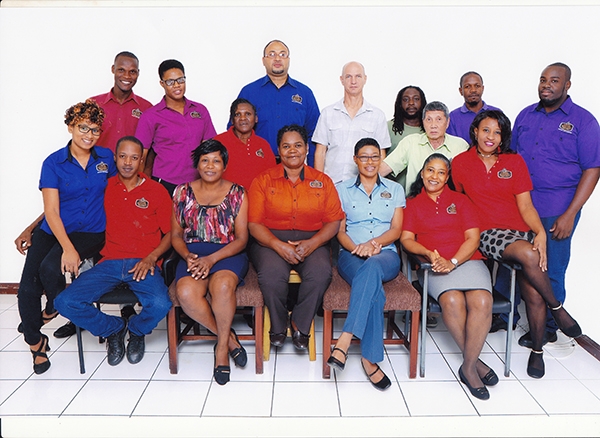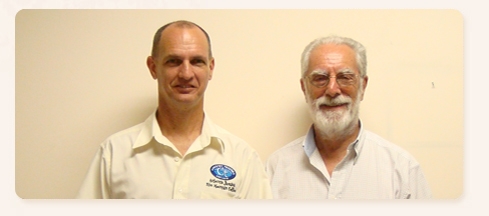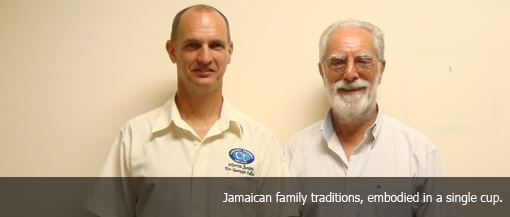Our Business
About Us
At Coffee Roasters of Jamaica, we’ve been successfully marketing Jamaica Blue Mountain® coffee for over sixteen years. I decided to establish Country Traders Limited the early nineties, after marketing Jablum coffee to the tourist trade on Jamaica’s north coast. I have always had a passion for coffee and excellence and decided to open my own Roastery where my vision of creating a perfect blend could come to life. I went to the Jamaican Coffee Industry Board for training as a cupper, so that along with our senior cupper – David K. Evans (one of Jamaica’s first and finest cuppers sent by Coffee Industry Board for training in England in 1991, and still actively cupping at the age of 86), so that I would be able to play an active role in maintaining the quality of our products.
As our business grew, my father, John Fletcher, retired from Salada Foods – one of the country’s largest coffee manufacturing companies. With his knowledge of manufacturing, having run Salada for many successful years and nowhere near ready for retirement, he was delighted to join the Coffee Roasters team. Usually the father starts the business and invites the children to join the company – this time it was the other way around. Regardless of how it began, my Dad and I make a great team.
We’re a family-run business, where we aim for quick and reliable service, placing our coffee in your hands within a maximum of three weeks (for orders of more than 10lbs), and smaller orders as little as two to three days. We know that our success depends entirely on maintaining our customer’s confidence in the quality of our products, so we pay close attention to your coffee every step of the way, through purchasing, cupping, roasting, packaging and delivery. Coffee Roasters of Jamaica supplies approximately 2000 lbs. of coffee every week to the Jamaican local market and tourism industry. We maintain good relationships with our coffee farmers to ensure the highest quality beans. All our coffee is Vacuum-packed in high-quality foil bags which gives maximum protection against oxidation (staling).
Jamaica produces about 4 million lbs of coffee beans each year, two thirds of which is Blue Mountain® coffee. Almost 90% of Jamaica’s coffee exports go to Japan so local quantities are quite small. When you buy coffee from Coffee Roasters of Jamaica you are assured of getting 100% Jamaican coffee – because that is the only coffee we handle. You’re also assured of getting the best value for your money – no middlemen, no mixed blends, no added extra costs.
Our History
It was the dawn of the 1990’s.
Our family lived in Kingston: a metropolitan city, industrialized, modern yet surrounded by a lovely countryside. One particularly beautiful area is the Blue Mountains, a lush and misty place, full of mystique and wonder, and the perfect site for the growing and harvesting of coffee berries.
…We found that in the heart of Kingston, many everyday habits of our early Jamaican lifestyle were disappearing, survived only as memories full of flavors and sweet aromas.
Aromas like the ones that came from a mother’s kitchen…the sweet scent of fried plantain, ackee and saltfish, and best of all…the aroma of coffee…real Jamaica Blue Mountain® coffee.
So I went to work…
In 1994, along with the help of my dad, whose years years of expertise in manufacturing proved invaluable, we established our roastery – Coffee Roasters of Jamaica Limited, one of the ten Jamaican roasters recognized and licensed by the Jamaican Coffee Industry Board.
With a commitment to bring coffee roasting back to traditionally high standards, I trained myself and team diligently to become experts in the craft of roasting and blending coffee beans.
Today, our dedication is the same as it was then.
Our blends come from typica arabica coffee beans, which are larger and produce a much higher quality of coffee. We produce 100% authentic Jamaica Blue Mountain® coffee, processed and roasted meticulously to the highest standards.
The methods and processes used in industrialized coffee production have never been part of our approach. We roast our coffee in small gas fired roasters(A Probat and a Lilla) carefully supervised by our devoted workers. As a result, we offer a subtle and multi-layered taste to our coffee which is both interesting and complex.
CRJ 100% authentic Blue Mountain® coffee is recognized all over the world for its full-bodied flavor and distinctive aroma.
So this is where, for both work and pleasure, our Jamaican family at Coffee Roasters of Jamaica are forever cultivating our roasting techniques and our beloved traditions to keep you our customers satisfied.
The Team
At Coffee Roasters of Jamaica we recognize that the people who really make a difference are the team of people who work behind the scenes to produce our coffees and sell them to our customers everyday.


Coffee Facts
Blue Mountain Coffee

Rising 7,402 feet above sea level, the majestic Blue Mountains are considered the most scenic in the Caribbean. Stretching between Port Antonio and Kingston, they’re easily accessible. You’ll discover tiny, quaint settlements, excellent hiking trails, breathtaking panoramas, and Blue Mountain® coffee for the connoisseur.From a distance, the Blue Mountains are indeed blue. A misty blue from the almost perpetual cover of clouds. But as you get closer, climbing the twisty, narrow roads, dodging the occasional goat, mule and cow, the mist thins and the colours become a green that’s unshakeable from memory.
As you climb higher and higher, the air gets cooler and crisper. At these higher elevations, it’s not unusual to drive right through clouds. Reach out of the window; you can feel their moisture. Weaving around the road, you’ll see bamboo plants sharing the rainforest like environment with tropical vines, ferns, banana plants and coconut trees. At about 3,000 feet elevation, you’ll enter the world famous Blue Mountain region.
Several small plantations dot the roadside and offer a good opportunity to stop, stretch your legs, and enjoy a cup of the world’s best coffee along with the awesome scenery.
The temperature drops significantly with elevation (60 degrees at the higher levels) and the air gets sweet. There are five major peaks on what is called the Grand Ridge: John Crow (5,750 feet), St. John’s Peak (6,332 feet), Mossman’s Peak (6,703), High Peak (6,812 feet) and the highest of all, Blue Mountain Peak (7,402 feet).
At the highest point of your excursion, you’ll find the military post of Newcastle. The road passes right through the Jamaica Defence Force training base here. Beyond the gatehouse, there is a parking area where you can enjoy the awe-inspiring view of what’s ahead, if you’re continuing down the other side.There are two routes through the mountains, Route A3 from Annotto Bay to Kingston is the principal road. The other, more scenic route, as described above, is B1. It travels from Buff Bay to Kingston via Newcastle.
However, paved roads won’t get you to any of the peaks. If you have a desire to get to the top, put on your boots and start walking. Good hiking trails exist and guided trips can be arranged. There are about 250 species of birds living in the mountains. They are also home to the six inch swallowtail butterfly, largest butterfly in the Western Hemisphere.
Overnight trips take hikers through coffee plantations, alongside waterfalls and on up to Blue Mountain Peak, the top of Jamaica. From that altitude, on a clear day, it’s said, you can see Cuba.
Blue Mountain® Coffee
The question now must be answered in cold, empirical terms. Is it truly the world’s best coffee? Any answer is subjective but there are many who have stood tall and declared their allegiance. Among the champions was author Ian Fleming. Fleming, who lived part time in Jamaica, would not allow his literary hero (and man of taste), James Bond, to drink any other. As Bond sits down for breakfast in a page of “Live and Let Die,” Fleming declares outright: “Blue Mountain® coffee, the most delicious in the world…”
The sentiment is shared far and wide but it may come as a surprise to the uninitiated that in the U.S., coffee aficionados pay more than $30 (and as much as $50) a pound for the pleasure.
Why so much? Because supply is low and demand is high. Blue Mountain tastes like no other. Its taste is tied to geographical and climatological phenomena found only in a tiny part of Jamaica.
Jamaican coffee comes from the arabica bean, a bean which is far more fragile and flavourful than the robusta bean. It also contains less caffeine than Robusta coffee.
The harvest of Blue Mountain® coffee is laborious and occurs only when the beans, or cherries as they are properly called, are ripe. They are literally hand-picked. One at a time. Coffee is not native to Jamaica. Or the Caribbean for that matter. Its origins lie in Yemen and it was carried across the globe by Europeans. Folklore has it that Louis XV of France sent three plants to Martinique in 1723. Two plants died en route and the lone surviving plant ended up in Jamaica. From that, the coffee industry now owes its heritage.
In 1953 the government decreed that only coffee grown in a specific region of the mountain range, and processed by four estates (Mavis Bank, Silver Hill, Moy Hall and the Government Station at Wallenford) could be certified as 100 percent Blue Mountain® coffee. Any other Jamaican coffee would be graded as, High Mountain or Low-Land coffee.
Jamaican coffee held a solid niche in the gourmet coffee market. But, in 1988 Jamaica was again pounded by a violent storm. Hurricane Gilbert , packing 150-mph winds, damaged 70 percent of the fields and factories, practically shutting down production for two years. Only recently has production been restored to former levels. Identifying marks on all Blue Mountain® coffee packages, assuring the premier quality, are part of the quality-control system established by the Coffee Industry Board. Package labels indicate if it is a blend or 100 percent.
Because of its cost, you will not find Blue Mountain® coffee served in all island hotels and restaurants. However, you can buy brand-name coffee such as Country Traders in local shops for considerably less than in the U.S. Until then, the original question remains. Is it the world’s best coffee? Savour a cup of your own. Surely you’ll agree with 007.
Reprinted with the kind permission of Destination Jamaica Magazine
